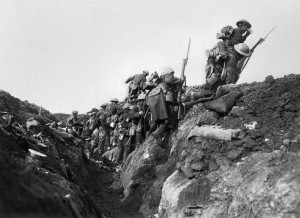‘Gimmick’ now seems to be the word that accompanies any announcement about an event that will make up the centenary of the First World War.
I started this year with great excitement. I tweeted back in February how ‘brilliant’ it was to see a summary of historians’ debates on the origins of the First World War being the most shared piece on BBC online.
My own research on the First World War had also received a new lease of life, with all sorts of fascinating requests coming in for me to give talks, do interviews, and write articles.
2014 was to be our year, when academics stop talking amongst themselves and, for once, the rest of the population wanted to hear.
How naïve I was.
In the past month, I’ve noticed things descend remarkably rapidly downhill. My excitement has dissolved, to be replaced by disappointment, despair and now serious consternation.
I can single out three announcements.
The first was ‘LIGHTS OUT’. No, not some energy efficiency drive – although I’ve no doubt that will be the most useful outcome – but an ‘encouragement’ for people up and down Britain to turn all but one of their lights out at 11pm, to mark 100 years since Britain declared war on Germany. It has been thought up following the words of Sir Edward Grey, Britain’s Foreign Secretary, spoken in August 1914: “The lamps are going out all over Europe, we shall not see them lit again in our life-time”.
Back in March, when I first heard of LIGHTS OUT I couldn’t understand the point. My lights are usually out by 11pm, both physically and metaphorically, as seems to be the case in most houses in my street, so this is hardly going to turn it into an exceptional moment in our lives. Exceptional would be to keep the lights on.
Last week, however, I saw a briefing on the event and the penny clicked. It’s a photo opportunity. Photographers will have an array of landmark buildings to choose from, which will all have been darkened apart from one strategically placed light.
Lovely. I can already see the images on the front pages of all the newspapers the next day. The start of four years of unprecedented slaughter reduced to a pretty photo opportunity. I don’t think I can imagine anything less appropriate.
Two weeks ago, I felt another surge of despair. This time with the announcement that schoolchildren will be sent poppy seeds to plant. In the Prime Minister’s words, this will ‘help the next generation understand the significance of what happened during the First World War’. I couldn’t quite believe what I was reading. So, are we actually encouraging school children to think that, by the simple act of planting a flower, they should feel closer to those who experienced the First World War, even to understanding it?
And today came the announcement that there will be a commemoration project marking the Christmas truce football game. It is, as Prince William puts it, ‘wholly relevant today as a message of hope over adversity.’ A number of academics have been quick to point out that we don’t even have any solid evidence that football was played. So, now we seem to be singling out potentially fictional events for remembrance, out of all those incredible, fascinating, mind-boggling things that we know actually did happen. And even if it did happen, surely it would be more appropriate to remember who, and how they, quelled this hope: the British authorities’ harsh orders against those who fraternised with the enemy. It was a war after all.
For someone who has spent the last decade researching people’s experiences of warfare, reading unflinching accounts of how war destroys, maims, and ruins lives, I was frustrated and despaired by how wrong, how misplaced, how insulting it is to commemorate the fighting with pretty, upbeat activities.
Those emotions have now faded. I’m now thinking about this centenary as a historian should do when they study the commemoration of war. Not for the insight it provides into the 1914-1918 war, but for insight it provides into the society doing the commemorating, in this case, people’s attitudes and behaviour in 2014.
My consternation remains, however. Not everyone will critically assess the centenary in the way I have quickly learnt to do.

